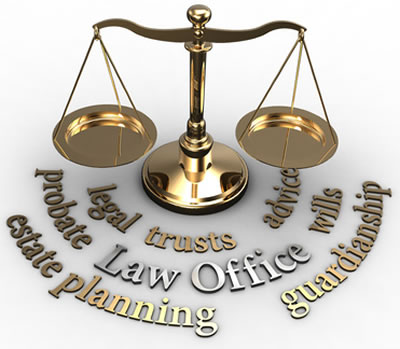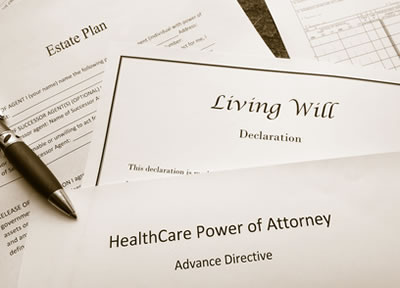Probate
 Probate is the formal court legal procedure that determines the validity of your will. It also appoints a personal representative who will administer the estate. It is the process that identifies assets, pays debts, taxes, and expenses of administration and distributes the remainder to the beneficiaries of the will.
Probate is the formal court legal procedure that determines the validity of your will. It also appoints a personal representative who will administer the estate. It is the process that identifies assets, pays debts, taxes, and expenses of administration and distributes the remainder to the beneficiaries of the will.
The basic job of administration and accounting for assets must be done whether the estate is handled by a personal representative in probate or whether probate is avoided because all assets were transferred to a living trust or jointly owned. There are three kinds of probate. A determination must be made regarding which type is applicable to the estate that needs to be probated. They are:
- Supervised. It is available in only limited circumstances and is always commenced with a formal proceeding. An estate is under the continuing authority of the court from the time of the entry of the initial order until all assets are distributed to the beneficiaries and the personal representative is discharged. Supervised administration may be preferable to unsupervised administration when an estate is insolvent, when the beneficiaries have conflicting interests, or there is a possibility of a will contest.
- Unsupervised. This is a simpler method and does not require continued court supervision. It is used for estates that exceed the asset limit for the small estate procedure. It may require the consent of all beneficiaries unless the will specifically states that the unsupervised procedure will be used. This form provides the personal representative greater freedom in administering the estate.
- Small-estate. This is the simplest and fastest form of probate. There are a variety of options that are available that can be used for this type of administration. The common denominator for all of the options is the minimal value of the estate. This form of probate should be considered first to see if it can be used.
The probate process is essentially the same regardless of which form you choose.
- Step One. Opening the estate.
- Step Two. Collecting the estate’s assets.
- Step Three. Managing the estate’s assets.
- Step Four. Handling taxes.
- Step Five. Closing the estate.
- Step Six. Distributing the assets.
One of the key considerations is the determination of the difference between probate and non-probate assets. The Walus Law Group can provide the necessary advice and guidance to ensure that the property is correctly identified and accounted for. This eliminates the potential to probate assets unnecessarily.
Estate Planning
 Everyone has an estate. It consists of all of your property, including your home and other real estate, tangible personal property such as cars and furniture, and intangible property such as insurance, bank accounts, stocks and bonds, and pension and Social Security benefits. Estate planning is about caring for your loved ones, making sure they are provided for and that your property is distributed according your wishes. Consider an estate plan to be a blueprint for where you want your property to go after you die. Estate planning is for everyone. It is not just for the elderly or the wealthy. We cannot predict how long we will live, accidents and illnesses effect everyone, regardless of age or social standing.
Everyone has an estate. It consists of all of your property, including your home and other real estate, tangible personal property such as cars and furniture, and intangible property such as insurance, bank accounts, stocks and bonds, and pension and Social Security benefits. Estate planning is about caring for your loved ones, making sure they are provided for and that your property is distributed according your wishes. Consider an estate plan to be a blueprint for where you want your property to go after you die. Estate planning is for everyone. It is not just for the elderly or the wealthy. We cannot predict how long we will live, accidents and illnesses effect everyone, regardless of age or social standing.
Ten things estate planning can do for you:
- Provide for your immediate family.
- Provide for other relatives who need help and guidance.
- Get your property to beneficiaries quickly.
- Ease the strain on your family.
- Minimize expenses.
- Reduce taxes on your estate.
- Make your retirement years easier.
- Plan for incapacity. Durable Power of Attorney, Health Power of Attorney.
- Help a favorite cause.
- Make sure your business goes on smoothly.[1]
An estate plan begins with a will or a living trust. Having a will does not avoid probate. Property titled in your name must go through the probate process before it can be distributed to your heirs. Legal fees and expenses are incurred. It can take nine (9) months to two (2) years to complete. Your probate file is open to the public. The court system controls the process, not your family.
For these and other reasons, a revocable living trust is preferred by many families and professionals. It can avoid probate at death. It prevents the court from controlling your assets if you become legally incapacitated, brings all of your assets together in one plan and provides privacy. One important feature is it can be changed by you at any time. Unlike a will, a trust continues after your death. It is managed by a trustee who you selected who will carry out your wishes after your death.
Two of the most important documents that should be a part of every estate plan is a Durable Power of Attorney and a Healthcare Power of Attorney. They are frequently ignored. However, you ignore them at your own risk. A Durable Power of Attorney is a document where an individual grants another individual, called an Attorney In Fact, the authority to make decisions on their behalf. The types of decisions customarily deal with the ordinary decisions of everyday life; the management of all or part of your business and personal life. Sounds simple, doesn’t it? Let me give you a real- life example. An elderly husband mistakenly thought that he could make decisions on behalf of his wife when she was diagnosed with dementia and was declared legally incompetent. This meant she could no longer legally make decisions on her own behalf, nor could she appoint her husband the authority to act on her behalf via a Durable Power of Attorney. They were both aware of what a Durable Power of Attorney was for, but they mistakenly thought that since they were a legally married couple, getting one prepared was unnecessary. They were sadly mistaken. The husband had to petition the probate court to be appointed her Guardian and Conservator. He had to submit an initial inventory of their assets and he has to prepare and submit an annual accounting of their income and expenses. In essence, their marriage is now under court supervision. Possessing a Durable Power of Attorney would have allowed the husband to continue to make the decisions that he wanted the freedom to do, but no longer can. This has proven to be a very expensive and frustrating lesson.
A Healthcare Power of Attorney, or a living will in other jurisdictions, is a document where an individual grants an agent full authority to make health-care decisions for them. You can only grant this authority when you are mentally competent to do so. The document details the decisions that are to be made on your behalf when you are no longer able to do so. This is an important document because it informs your family and friends what your wishes are regarding continued health care when you are no longer able to make decisions on your own behalf. This is especially important today considering the advances that medicine has made. You can be artificially kept alive for an indefinite period of time. Medical personnel will look to you for guidance on whether or not to resuscitate you or let you die in life-threatening situations. If the procedures would leave you in pain or a vegetative state, you might not want them performed. You make your wishes known through a Healthcare Power of Attorney.
[1] The American Bar Association – Guide to Wills & Estates, Third Ed., Random House Reference (2009), pages 6,7.
